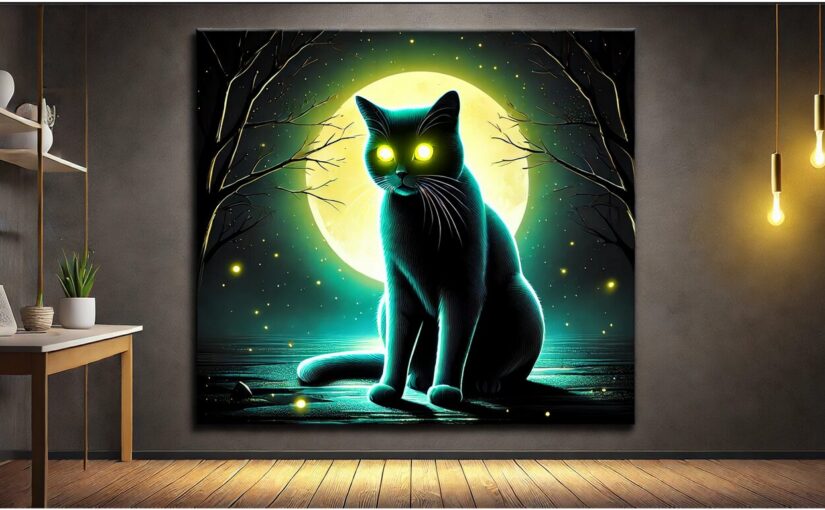Have you ever been startled by the eerie glow of your cat’s eyes shining back at you in the dark? Whether you’re walking into a dimly lit room or snapping a photo of your feline friend, their glowing eyes can seem downright magical. But rest assured, there’s no sorcery involved—just fascinating biology and evolutionary adaptation at work. Let’s explore why cats’ eyes glow in the dark and what makes this unique feature so important to our feline companions.
The Science Behind the Glow
Cats’ eyes glow in the dark because of a special structure in their eyes called the tapetum lucidum. This Latin term translates to “bright tapestry,” and it’s an apt description. The tapetum lucidum is a reflective layer of cells located behind the retina, and its primary function is to improve night vision. When light enters your cat’s eye, it passes through the retina, hits the tapetum lucidum, and reflects back through the retina a second time.
This process essentially gives the retina another chance to absorb any available light, enhancing a cat’s ability to see in low-light conditions. The glow you see is this reflected light being bounced back out of the eye.
Why Cats Need Superior Night Vision
Cats are crepuscular creatures, which means they are most active during dawn and dusk. These twilight hours often have limited light, so good night vision is crucial for their hunting and survival. In the wild, cats rely on their ability to detect movement and pounce on prey even in near darkness. The tapetum lucidum gives them a significant advantage over predators and prey that don’t have this adaptation.
Why Do Cat Eyes Glow Different Colors?
If you’ve noticed that your cat’s glowing eyes sometimes appear yellow, green, or even blue, you’re not imagining things. The color of the glow depends on the specific composition of the tapetum lucidum, which varies between cats. Factors that influence this color include:
- Breed: Certain breeds, such as Siamese cats, may have less reflective tapetum lucidum, which can affect the glow’s brightness and color.
- Age: Older cats may experience changes in eye structure, which can slightly alter the glow.
- Health: Eye conditions, such as cataracts, can impact how light reflects from the tapetum lucidum.
The Difference Between Cats’ Eyes and Human Eyes
Humans lack a tapetum lucidum, which is why our eyes don’t glow in the dark. Instead, our vision relies heavily on good lighting. While humans have more cone cells in their retinas (responsible for color vision), cats have more rod cells, which are better at detecting light and movement in low-light conditions. This trade-off explains why cats are excellent hunters at night but are less adept at perceiving colors than we are.
Are Cats’ Eyes Actually Glowing?
While it might look like your cat’s eyes are producing their own light, the glow is simply a reflection of external light sources. Without any light in the environment, even a cat’s tapetum lucidum can’t create a glow. This is why their eyes seem to shine when illuminated by headlights, flashlights, or your camera’s flash—but not in complete darkness.
Fun Facts About Cats’ Glowing Eyes
- Other Animals Have It Too: Cats aren’t the only animals with a tapetum lucidum. Many nocturnal creatures, including dogs, raccoons, and deer, have this feature to help them see in the dark.
- Not All Glows Are Equal: Domestic cats often have more pronounced eye glow than wild cats like lions or tigers, whose tapetum lucidum is less reflective due to their daytime hunting habits.
- Photographers Beware: The tapetum lucidum is why your cat often has “laser eyes” in photos. Try using natural light or angling the camera to avoid this reflective phenomenon.
When the Glow Isn’t Normal
Sometimes, a cat’s eye glow can signal an underlying health issue. If one eye glows differently than the other, or if the glow appears unusually dim or absent, it could indicate:
- Cataracts
- Retinal detachment
- Glaucoma
- Eye infections
If you notice any changes in your cat’s eye glow or behavior, consult your veterinarian for an evaluation.
For more information, visit Cornell Feline Health Center, Feline Vision Problems
How to Minimize the Glow in Photos
If your cat’s glowing eyes are ruining your Instagram-worthy shots, here are a few tips to reduce the glare:
- Adjust the lighting: Use softer, indirect light instead of a flash.
- Change the angle: Take photos from the side to minimize the reflection.
- Edit afterward: Many photo editing apps have tools to reduce eye glare.
Conclusion: A Built-In Superpower
Your cat’s glowing eyes aren’t just a spooky party trick—they’re a testament to the incredible adaptations that make felines such successful hunters. The tapetum lucidum is a key part of their evolutionary toolkit, allowing them to see the world in ways humans can only imagine.
So the next time you see your cat’s eyes shining in the dark, take a moment to appreciate the biology behind the glow. It’s just one more reason to marvel at how amazing our feline friends truly are.







Thankyou for posting.Woh I am happy to find this website through google. “If one does not know to which port one is sailing, no wind is favorable.” by Seneca.